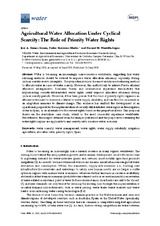Agricultural Water Allocation Under Cyclical Scarcity: The Role of Priority Water Rights
Autor
Gómez-Limón, José A.
Gutiérrez-Martín, Carlos
Montilla-López, Nazaret M.
Editor
MDPIFecha
2020Materia
Water scarcityWater management
Water rights
Water supply reliability
Irrigation agriculture
Allocation rules
Priority rights
Spain
METS:
Mostrar el registro METSPREMIS:
Mostrar el registro PREMISMetadatos
Mostrar el registro completo del ítemResumen
Water is becoming an increasingly scarce resource worldwide, suggesting that water rationing methods should be revised to improve water allocation efficiency, especially during cyclical scarcity events (droughts). The proportional rule is the most widely used rationing method to allocate water in cases of water scarcity. However, this method fails to achieve Pareto-efficient allocation arrangements. Economic theory and international experience demonstrate that implementing security-differentiated water rights could improve allocative efficiency during cyclical scarcity periods. Moreover, it has been proven that this kind of priority rights regime is an efficient instrument to share risks related to water supply reliability, and can thus be considered as an adaptation measure to climate change. This evidence has enabled the development of an operational proposal for the implementation of security-differentiated water rights in the irrigation sector in Spain, as an alternative to the current rights based on the proportional rule. This proposal draws on the Australian case study, which is the most successful experience worldwide. Nevertheless, the insights obtained from the analysis performed and the proposal for reforming the water rights regime are applicable to any country with a mature water economy.
Fuente
Water 12(6), 1835 (2020)Versión del Editor
http://dx.doi.org/10.3390/w12061835Ítems relacionados
Mostrando ítems relacionados por Título, autor o materia.
-
The Economic Analysis of Water Use in the Water Framework Directive Based on the System of Environmental-Economic Accounting for Water: A Case Study of the Guadalquivir River Basin
Gutiérrez-Martín, Carlos; Borrego-Marín, M.M.; Berbel, Julio (MDPI, 2017)This paper develops a methodology for the economic analysis of water use proposed by the Water Framework Directive (WFD) based on the System of Environmental-Economic Accounting for Water (SEEA-Water) standard tables. Our ... -
Water Economics and Policy
Berbel, Julio; Gutiérrez-Martín, Carlos; Martín-Ortega, Julia (MDPI, 2017)Economics plays a double role in the field of water management, firstly as a powerful analytical tool supporting water allocation and policy decisions, and secondly in the form of policy instruments (water pricing, ... -
Literature review on rebound effect of water saving measures and analysis of a Spanish case study
Montesinos Barrios, Pilar; Berbel, Julio; Rodríguez-Díaz, Juan Antonio; Camacho Poyato, Emilio; Gutiérrez-Martín, Carlos (Springer, 2015)The hypothesis of a rebound effect as a consequence of water saving investments is taken analogically from the Jevons paradox models in energy economics. The European Commission (EC) alert about the consequences in water ...

